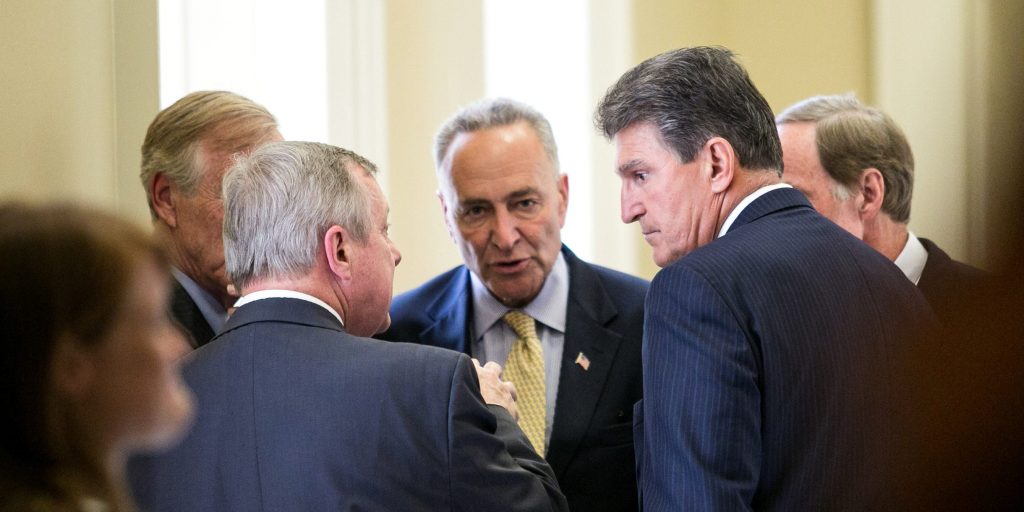- Democrats are putting forward a measure to slash drug prices through a Senate review.
- It's the first step to revive their stalled economic agenda, and Manchin is on board with this part.
- Other parts of the economic bill are still up in the air, like an extension of ACA subsidies.
Senate Democrats are taking the first step to revive swaths of their dormant economic agenda with a greenlight from Sen. Joe Manchin of West Virginia. It amounts to the most serious attempt to enact some parts of their economic plans in 2022, seven months after they fell apart due to Manchin's opposition.
Democrats are putting forward a measure to slash prescription drug prices, intended to pass using the intricate reconciliation process — a maneuver allowing Democrats to circumvent a Republican filibuster and approve bills with a simple majority vote. The first step in that process is a review from the Senate parliamentarian, the top official overseeing what can be included in such a bill.
Passing a bill through reconciliation would require a unanimous vote from Senate Democrats in the evenly divided chamber, and while Manchin has been a key holdout on many parts of the broader agenda, he has expressed support for prescription drug reform. "Senator Manchin has long advocated for proposals that would lower prescription drug costs for seniors and his support for this proposal has never been in question," Manchin spokesperson Sam Runyon said in a statement. "He's glad that all 50 Democrats agree."
The 190-page bill text from the Senate Finance Committee shows part of the package is intended to:
- Allow Medicare to negotiate prices for some drugs starting next year
- Cap price increases at inflation in Medicare and private insurance
- Limit out-of-pocket costs for Medicare beneficiaries at $2,000 annually
- Provide free vaccines to seniors
Experts say these provisions are capable of providing financial relief to both the private and public sector.
"There is potential here with the drug pricing reforms to save money for the government, employers, and patients," Larry Levitt, executive vice president for health policy at the Kaiser Family Foundation, told Insider. "That's a trifecta that's quite unusual in health care."
He continued: "The trade-off is potentially somewhat fewer new drugs coming to market, a point the pharmaceutical industry will continue to hammer away at."
The fate of a proposed $35 monthly cap on insulin is unclear. It's a top Democratic priority that was included in the House-approved legislation that died in the Senate. But it was not within the current legislation undergoing the review process. It was at always at risk of falling out of the bill if the Senate parliamentarian deemed it unrelated to the federal budget.
Senate Majority Leader Chuck Schumer has committed to putting forward a an alternate bipartisan bill from Sens. Susan Collins of Maine and Jeanne Shaheen of New Hampshire that would establish the $35 limit on insulin starting in 2023. The measure would omit people without health insurance.
Talks are underway and it's unclear whether the insulin legislation would secure the backing of 10 Senate Republicans needed to clear a filibuster to pass the upper chamber. GOP lawmakers tend to oppose federal price controls, arguing they stymie research and innovation.
Other parts of the economic spending bill remain up in the air, such as an extension of enhanced federal subsidies under the Affordable Care Act set to expire in December and a range of clean energy tax credits.

